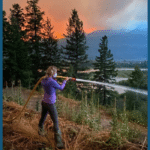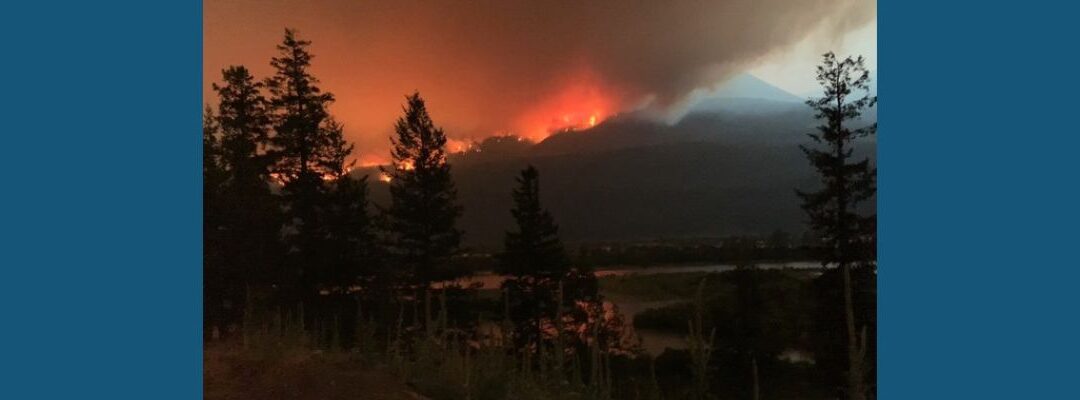By Bill Stovin
“The fire was coming from the south, down the valley. The nearest gas station was 150 km west or 60Km east of the community of Golden”
 Arden Henley is recalling the moment when a community social service agency in B.C. faced an evacuation alert. It is recounted in a GTEC webinar called Preparing Your Organization for the 2025 Fire Season put together for the Federation of Community Social Services of B.C. The FCSS is an umbrella organization for 150-member agencies throughout BC that provide a range of services to children, youth, seniors, new immigrants and people with physical and mental challenges.
Arden Henley is recalling the moment when a community social service agency in B.C. faced an evacuation alert. It is recounted in a GTEC webinar called Preparing Your Organization for the 2025 Fire Season put together for the Federation of Community Social Services of B.C. The FCSS is an umbrella organization for 150-member agencies throughout BC that provide a range of services to children, youth, seniors, new immigrants and people with physical and mental challenges.
The Preparing Your Organization for the 2025 Fire Season webinar is aimed at preparing organizations for the impacts of climate change, in this instance, wildfire and smoke. In addition to an interview with the Executive Director of a community organization in Golden, BC the webinar includes interviews with a fire ecologist, psychologist and doctor.
In earlier research with the Federation, Henley, GTEC’s executive director, learned that many organizations aren’t prepared for such impacts. Many wonder about where to even begin preparing.
Watch the entire webinar on GTEC’s YouTube channel (@CanadaGTEC):
Henley’s thinking about the threats of climate change began to take shape in 2019 when he and former colleagues from City University in Canada founded GTEC, a non-profit, focused on delivering environmental programs in the community.
Partnerships with Neighbourhood Houses and 14 different environmental organizations would develop, followed by a ‘Hope and Crisis’ town hall where participants expressed their concerns and fears as well as ideas for positive environmental change.
Henley says those early gatherings informed thinking around GTEC’s Community-based Collaborative Model.
“The GTEC Community-based, Collaborative Model entails working with pre-existing networks of community-based organizations like the Federation.The basic premise of this model is that communities need to complement the efforts of government in preparing people to respond to the impacts of climate change.”
In research with Federation members GTEC developed an instrument with social science partners from the Mental Health Climate Change Alliance to assess organizations’ capacity and readiness. GTEC then developed a road map that they can use to start preparing though each community organization will face different conditions. For example, the community in Golden:
“In facing evacuation one of the things that this organization learned is that there are a lot of people in their community who don’t have enough money to gas up their pickup truck and get far enough away from the fire. There’s a lot of seasonal workers and new immigrants in their community that are below the poverty line. This organization learned that you need to identify those people with the prospect of evacuation and provide gas cards so they can actually leave.”
Another consideration for organizations is how to protect records in the event of a fire.
“You have highly sensitive and confidential information. How do you manage that?”
In the health care community GTEC is partnering with the Canadian Coalition for Green Health Care which represents hospitals, medical clinics and seniors’ centres. A recent workshop drew participants from across Canada as they learned how to adapt their institutions for extreme heat.
In health care facilities that have air conditioning, one of the challenges is how to continue protecting vulnerable populations while ensuring that medical devices such as MRIs that use a lot of energy can still operate effectively. At the same time, many health care organizations operate in old buildings and do not have air conditioning.
Overall, Henley says, even though many agencies in the health care and community social services sectors have experienced climate change impacts and others close calls many other organizations have not sufficiently prepared for such contingencies. Already overloaded with demands and subject to limited resources preparing for the impacts of climate change has not yet become a priority.
In the meantime, GTEC continues to refine its road map and educational initiatives.
“We’re talking now about creating a communities of practice – people who have already had close calls or experience and bringing them together as a resource for people who want to know more under emergency circumstances.”
Photo credit: Katie Hodder
Read articles on climate change, sustainability, education, and more from GTEC’s Communication & Media (formally GTEC Blog)!
Preparing for wildfires should not be overlooked, which is why GTEC and the Federation of Community Social Services of B.C. produced a webinar in March 2024 called Preparing Your Organization for the 2024 Wildfire Season. Watch the webinar here.
Subscribe to GTEC’s YouTube channel @CanadaGTEC !

